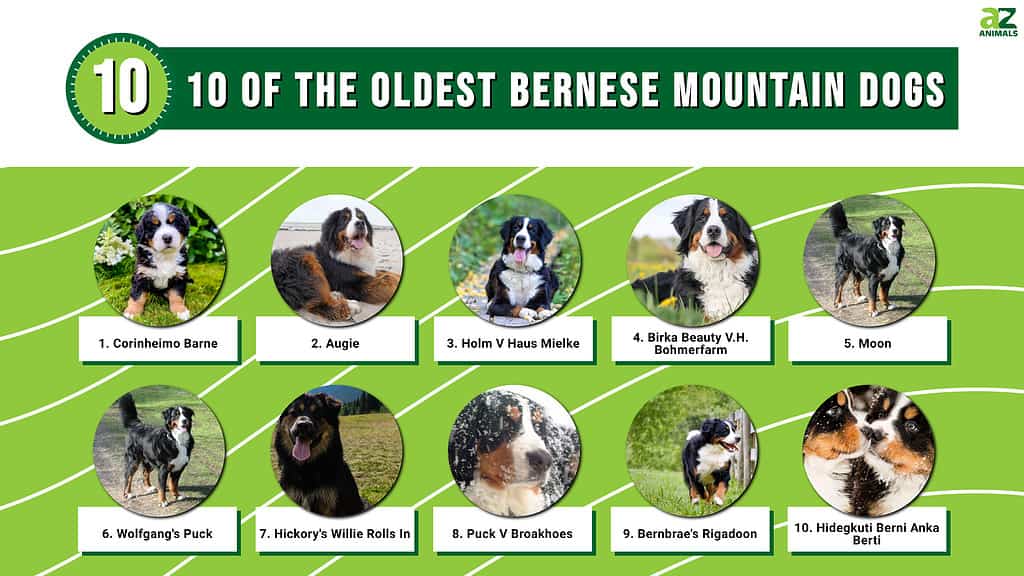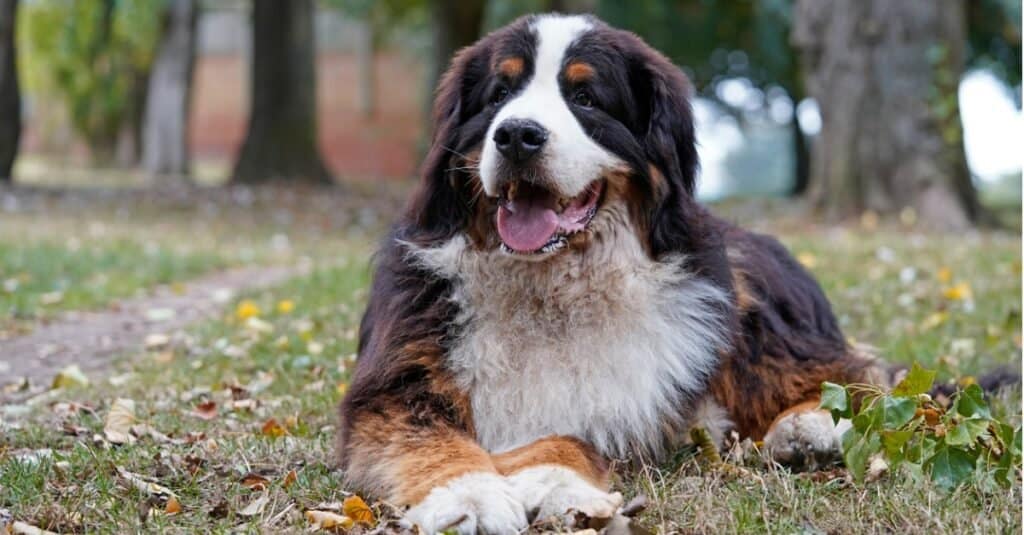
Bernese Mountain dogs were originally bred as farm dogs in Switzerland. Today, they’re popular family dogs, as they are intelligent, tolerant of other pets, and good with kids. If you’re looking to add a dog to your family, an important factor to consider is the lifespan of your chosen breed.
A Bernese Mountain dog lover named Karlo Laforteza has kept an informal database of Bernese Mountain dogs that have reached old age. While these individuals are not verified, this anecdotal list provides a snapshot of this dog’s lifespan.
These are 10 of the oldest Bernese Mountain dogs:
- Corinheimo Barne: 17.83 Years Old
- Augie: 17.59 Years Old
- Holm V Haus Mielke: 17.17 Years Old
- Birka Beauty V.H. Bohmerfarm: 16.88 Years Old
- Moon: 16.67 Years Old
- Wolfgang’s Puck: 16.66 Years Old
- Hickory’s Willie Rolls In: 16.04 Years Old
- Puck V Broakhoes: 15.78 Years Old
- Bernbrae’s Rigadoon: 15.78 Years Old
- Hidegkuti Berni Anka Berti: 15.76 Years Old
There are unsubstantiated reports of a Bernese Mountain dog that lived to be 25 years old! The dog lived in Ronsberg, Bavaria. Considering the oldest verified dog on earth is younger than that, the likelihood that this German dog lived 25 years is highly unlikely.
The Oldest Verified Bernese Mountain Dog
Bernese Mountain dogs originally arrived in the USA via a farmer from Kansas in 1926. The American Kennel Club, an organization for purebred dogs registered in the USA, officially recognized the breed in 1937.
The oldest verified Bernese mountain dog lived 15 years and two months, as documented by the AKC.
How Old Do Bernese Mountain Dogs Get?

The Bernese Mountain dog has the shortest lifespan of all dog breeds.
©iStock.com/Kriste Sorokaite
Since these dogs are a large breed, their life expectancy is on the short side. In fact, this breed has the shortest lifespan of all dog breeds. Females live almost nine years, while males don’t quite reach eight. This means that the average dog, regardless of gender, may live between eight and nine years.
In comparison, the average lifespan across all dog breeds is about 10 years old. No one is quite sure why smaller dogs live longer than large ones. It may have something to do with cell division in the larger mass of tissue present in bigger animals.
What Diseases Do Bernese Mountain Dogs Get?
All dogs are prone to diseases. However, Bernese Mountain dogs are uniquely susceptible to certain ailments. These diseases include histiocytosis, gastric volvulus, and joint dysplasia.
Some diseases that affect old Bernese Mountain dogs are:
- Histiocytosis
- Progressive Retinal Atrophy
- Von Willebrand’s Disease
- Degenerative Myelopathy
- Gastric Volvulus
- Hip or Elbow Dysplasia
- Cruciate Disease
Making sure that your pet is as healthy as it can be is undoubtedly your top priority. Before purchasing a Bernese Mountain dog, request genetic testing that will help you avoid some of these common ailments. However, it is not possible to predict every malady that may affect your dog.
Gastric Dilation and Volvulus
Gastric volvulus, a condition in which gas becomes trapped in the stomach, comes on fast and may kill a dog if not addressed. However, only about two percent of afflicted dogs end up losing their lives. It is common in large dogs, so it’s important for owners to know the signs and symptoms.
Common symptoms include bloating and retching, caused by a gas buildup in the stomach. Sometimes it resolves itself but can quickly become fatal.
In extreme cases, both entrances of the stomach become blocked. Immediate care from a veterinarian is required at this stage for the dog to survive. Older dogs are more at risk and need to be monitored closely.
Progressive Retinal Atrophy
Progressive retinal atrophy is an eye disease that often causes blindness in affected individuals. Blindness comes on slowly and is usually preceded by a sensitivity to light at nighttime. It isn’t painful and sometimes it goes unnoticed until it’s advanced.
This disease is related to the retina, which refers to a cell layer on the back of the eyeball. This cell layer detects incoming light and turns it into electrical stimuli, which the brain interprets into images. Progressive retinal atrophy occurs when these retina cells slowly degrade and die.
This disease is genetic. Because of its recessive nature, both dog parents must carry the genes for the disease to appear in their offspring.
Some other affected breeds include Bedlington terriers, American cocker spaniels, rottweilers, golden retrievers, and English springer spaniels.
Cause of Death for Most Bernese Mountain Dogs
Over half of Bernese Mountain dogs die because of some form of cancer. More than 25 percent of this breed dies from histiocytosis in particular.
The two particular diseases associated with the term histiocytosis include systemic histiocytosis and malignant histiocytosis. Both involve the immune system cells called histiocytes. However, systemic histiocytosis affects younger dogs and is treatable, while malignant histiocytosis afflicts older dogs and is almost always fatal.
Histiocytosis is a genetic disease. As a result, the family members of affected dogs are at risk of developing the disease. Additionally, this disease skips generations, making predictions more complicated.
Malignant Histiocytosis in Older Bernese Mountain Dogs
When the histiocytes of the immune system begin malfunctioning, they sometimes cause tumors throughout a dog’s body. Fever, appetite loss, lethargy, and a quick drop in weight are common and observable symptoms.
Affected dogs will show symptoms once tumor formation causes organ degradation. Commonly afflicted organs include the spinal cord, lungs, spleen, kidneys, lymph nodes, and liver. There is no cure for this disease and symptoms usually only occur once it is advanced.
Summary of the 10 Oldest Bernese Mountain Dogs
Hickory’s Willie Rolls In: 16.04 Years Old
Puck V Broakhoes: 15.78 Years Old
Bernbrae’s Rigadoon: 15.78 Years Old
Hidegkuti Berni Anka Berti: 15.76 Years Old
| Rank | Name of Bernese Dog | Age |
|---|---|---|
| 1 | Corinheimo Barne | 17.83 years old |
| 2 | Augie | 17.59 years old |
| 3 | Holm V Haus Mielke | 17.17 years old |
| 4 | Birka Beauty V.H. Bohmerfarm | 16.88 years old |
| 5 | Moon | 16.67 years old |
| 6 | Wolfgang’s Puck | 16.66 years old |
| 7 | Hickory’s Willie Rolls In | 16.04 years old |
| 8 | Puck V Broakhoes | 15.78 years old |
| 9 | Bernbrae’s Rigadoon | 15.78 years old |
| 10 | Hidegkuti Berni Anka Berti | 15.76 years old |
The photo featured at the top of this post is © iStock.com/Kriste Sorokaite
Ready to discover the top 10 cutest dog breeds in the entire world?
How about the fastest dogs, the largest dogs and those that are -- quite frankly -- just the kindest dogs on the planet? Each day, AZ Animals sends out lists just like this to our thousands of email subscribers. And the best part? It's FREE. Join today by entering your email below.
Thank you for reading! Have some feedback for us? Contact the AZ Animals editorial team.






